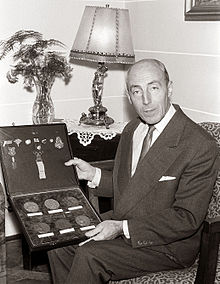
Czechoslovakia competed at the 1928 Summer Olympics in Amsterdam, Netherlands. 70 competitors took part in 51 events in 14 sports.

The men's rings was a gymnastics event contested as part of the Gymnastics at the 1964 Summer Olympics programme at the Tokyo Metropolitan Gymnasium. The event was held on 18, 20, and 22 October. There were 128 competitors from 29 nations, with nations in the team competition having up to 6 gymnasts and other nations entering up to 3 gymnasts. The event was won by Takuji Hayata of Japan, the nation's first victory in the rings after two Games with bronze medals. Silver went to Franco Menichelli of Italy, the nation's first rings medal since 1932. Boris Shakhlin of the Soviet Union took bronze, breaking a three-Games gold medal streak for the Soviets. Shakhlin was the fourth man to win multiple medals in the rings, adding to his 1960 silver.

The men's vault was a gymnastics event contested as part of the Gymnastics at the 1964 Summer Olympics programme at the Tokyo Metropolitan Gymnasium. The event was held on 18, 20, and 23 October. There were 130 competitors from 30 nations, with nations in the team competition having up to 6 gymnasts and other nations entering up to 3 gymnasts. For the first time in three Games, there was a clear winner with no tie. Haruhiro Yamashita took the gold medal, the second consecutive gold for Japan. Victor Lisitsky finished second, taking silver but breaking the Soviet Union's three-Games gold medal streak. Hannu Rantakari's bronze was Finland's first medal in the event since 1948.

Vlasta Děkanová was a Czechoslovak artistic gymnast. She was the first World all-around champion in women's artistic gymnastics.
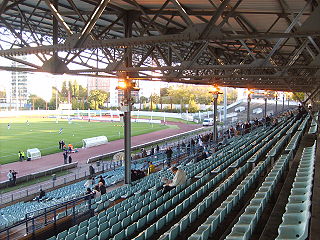
The men's parallel bars event was part of the gymnastics programme at the 1924 Summer Olympics. It was one of nine gymnastics events and it was contested for the third time after 1896 and 1904. The competition was held on Sunday, July 20, 1924. Seventy-two gymnasts from nine nations competed. The event was won by August Güttinger of Switzerland, the nation's first victory in the event. Robert Pražák of Czechoslovakia and Giorgio Zampori of Italy earned silver and bronze, respectively.

The men's rings event was part of the gymnastics programme at the 1924 Summer Olympics. It was one of nine gymnastics events and it was contested for the third time after 1896 and 1904. The competition was held on Saturday, July 19, 1924. Seventy gymnasts from nine nations competed, with each nation having an 8-gymnast team. The event was won by Francesco Martino of Italy, the nation's first medal in the event. Robert Pražák and Ladislav Vácha of Czechoslovakia earned silver and bronze, respectively.

The men's horizontal bar event was part of the gymnastics programme at the 1924 Summer Olympics. It was one of nine gymnastics events and it was contested for the third time after 1896 and 1904. The competition was held on Saturday, July 19, 1924. Seventy-two gymnasts from nine nations competed. The event was won by Leon Štukelj of Yugoslavia, with Jean Gutweninger of Switzerland taking silver and André Higelin of France bronze. It was the first medal in the horizontal bar for each of those nations.

The men's artistic individual all-around event was part of the gymnastics programme at the 1924 Summer Olympics. It was one of nine gymnastics events and it was contested for the sixth time. The competition was held from Thursday, 17 July 1924, to Wednesday, 23 July 1924. Seventy-two gymnasts from nine nations competed. Each nation could send up to 8 gymnasts, up from 6 in previous Games. For the first time since 1904, the scores for individual competitors were used to calculate a team score. The men's artistic individual all-around was won by Leon Štukelj of Yugoslavia. Czechoslovakia's Robert Pražák took silver, while Bedřich Šupčík earned bronze. Both nations were making their debut in the event.

The men's parallel bars event was part of the gymnastics programme at the 1928 Summer Olympics. It was one of seven gymnastics events for men and it was contested for the fourth time after 1896, 1904, and 1924. The competition was held on Thursday, August 9, 1928. Eighty-five gymnasts from eleven nations competed, with each nation having a team of up to 8 gymnasts. The event was won by Ladislav Vácha of Czechoslovakia, the nation's first victory in the men's parallel bars. The silver medal went to Josip Primožič of Yugoslavia, with Hermann Hänggi of Switzerland earning bronze.

The men's rings or flying rings event was part of the gymnastics programme at the 1932 Summer Olympics. It was contested for the fifth time after 1896, 1904, 1924, and 1928. The competition was held on Friday, August 12, 1932. Fourteen gymnasts from six nations competed. There were 14 gymnasts from six nations. Each nation was limited to three gymnasts. The event was won by George Gulack of the United States, the nation's first medal in the rings since 1904 and second overall. Another American, Bill Denton, took silver. The United States was not able to complete a repeat of its 1904 sweep, however, as Italy's Giovanni Lattuada beat the third American, Richard Bishop, by one-tenth of a point for the bronze.
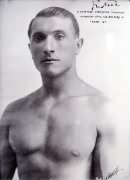
The men's artistic individual all-around event was part of the gymnastics programme at the 1932 Summer Olympics. It was the eighth appearance of the event, which was established in 1900. The competition was held from Monday, August 8, 1932, to Wednesday, August 10, 1932. Twenty-four gymnasts from five nations competed. Each nation could enter a team of 5 gymnasts; Hungary sent only 4. The event was won by Romeo Neri of Italy, the nation's first victory in the event since 1920 and fourth overall. István Pelle of Hungary took silver and Heikki Savolainen of Finland earned bronze; it was the first medal in the event for each nation.

The men's pommel horse event was part of the gymnastics programme at the 1928 Summer Olympics. It was one of seven gymnastics events for men and it was contested for the fourth time after 1896, 1904, and 1924. The competition was held on Wednesday, August 8, 1928. Eighty-eight gymnasts from eleven nations competed, with each nation having a team of 8 gymnasts. The event was won by Hermann Hänggi of Switzerland, the nation's second consecutive victory in the pommel horse. The Swiss nearly repeated their 1924 medal sweep, with 4 of the top 5, but Finland's Heikki Savolainen took bronze between silver medalist Georges Miez and fourth-place finisher Edi Steinemann. It was Finland's first medal in the event.
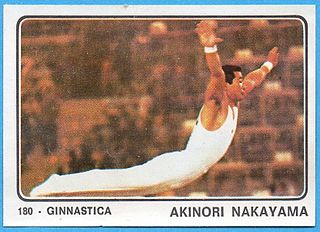
The men's rings competition was one of eight events for male competitors in artistic gymnastics at the 1972 Summer Olympics in Munich. The qualification and final rounds took place on August 27, 29 and September 1 at the Olympiahalle. There were 111 competitors from 26 nations ; nations entering the team event had 6 gymnasts while other nations could have up to 3 gymnasts. The top two places were the same as in 1968, while the next two places were taken by the same gymnasts but in the opposite order. The event was won by Akinori Nakayama of Japan, the nation's third consecutive victory in the men's rings; Nakayama was the second man to successfully defend an Olympic title in the event. Mikhail Voronin's second consecutive silver extended the Soviet Union's podium streak in the rings to six Games. Nakayama and Voronin were the fifth and sixth men to earn multiple medals in the rings. Mitsuo Tsukahara of Japan took bronze, switching places with fourth-place finisher Sawao Kato from the previous Games.

The men's rings competition was one of eight events for male competitors in artistic gymnastics at the 1980 Summer Olympics in Moscow. The qualification and final rounds took place on July 20, 22 and 25th at the Luzhniki Palace of Sports. There were 65 competitors from 14 nations, with nations competing in the team event having 6 gymnasts while other nations could have to up to 3 gymnasts. The event was won by Alexander Dityatin of the Soviet Union, the nation's fifth victory in the rings, with fellow Soviet Aleksandr Tkachyov taking silver. It was the second consecutive Games that the Soviet Union had the top two men in the rings. Dityatin, the silver medalist in Montreal 1976, was the seventh man to win multiple medals in the rings. Jiří Tabák earned Czechoslovakia's first medal in the event since 1948.
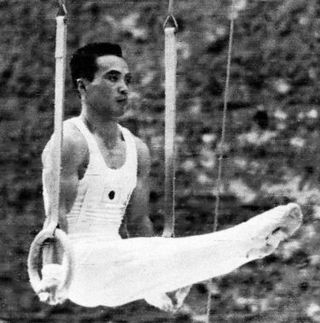
The men's rings competition was one of eight events for male competitors in artistic gymnastics at the 1960 Summer Olympics in Rome. It was held on 5, 7, and 10 September at the Baths of Caracalla. There were 129 competitors from 28 nations, with nations in the team competition having up to 6 gymnasts and other nations entering up to 2 gymnasts. The event was won by Albert Azaryan of the Soviet Union, the first man to successfully defend an Olympic title in the rings. Boris Shakhlin took silver, making it the third consecutive Games the Soviets finished in the top two. Takashi Ono tied with Velik Kapsazov for bronze, giving Japan its second consecutive Games with at least one bronze medal and Bulgaria its first medal in the rings.

The men's vault event was part of the gymnastics programme at the 1928 Summer Olympics held in Amsterdam. It was one of seven gymnastics events for men and it was contested for the fourth time after 1896, 1904, and 1924. Scores from the vault event were added to the results from other individual apparatus events to give aggregate scores for the individual and team all-around events. There were 85 competitors from 11 nations. Each nation had a team of 8 gymnasts; three of the 88 men did not start. The event was won by Eugen Mack of Switzerland, the nation's first victory in the event and first medal since 1896. Emanuel Löffler gave Czechoslovakia its second consecutive silver medal. Stane Derganc's bronze was Yugoslavia's first medal in the event.
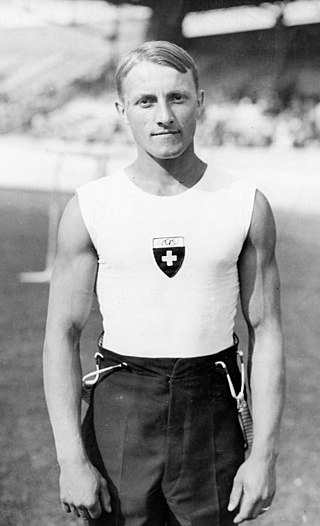
The men's horizontal bar event was part of the gymnastics programme at the 1928 Summer Olympics. It was one of seven gymnastics events for men and it was contested for the fourth time after 1896, 1904, and 1924. Scores from the horizontal bar event were added to the results from other individual apparatus events to give aggregate scores for the individual and team all-around events. There were 86 gymnasts from 11 nations, with each nation having a team of up to 8 gymnasts. The event was won by Georges Miez of Switzerland, the nation's first victory in the men's horizontal bar. The silver medal went to Romeo Neri of Italy, with Eugen Mack of Switzerland earning bronze.

The men's artistic individual all-around event was part of the gymnastics programme at the 1928 Summer Olympics. It was one of seven gymnastics events for men and was the seventh Olympic men's all-around gymnastic championship. Scores from the individual apparatus events were added to give aggregate scores for the individual all-around; individual all-around scores were similarly summed for the team all-around event. There were 88 competitors from 11 nations. Each nation sent a team of 8 gymnasts. The event was won by Georges Miez of Switzerland, with his countryman Hermann Hänggi taking silver. They were the first medals in the event for Swiss gymnasts since 1904 and the first gold medal ever for a Swiss man in the individual all-around. Defending Olympic champion Leon Štukelj of Yugoslavia finished with the bronze this time, making him the third man to win multiple medals in the event.

The men's rings competition at the 1936 Summer Olympics was held at the Waldbühne on 10 and 11 August. It was the sixth appearance of the event. There were 111 competitors from 14 nations, with each nation sending a team of up to 8 men. The event was won by Alois Hudec of Czechoslovakia, the nation's first victory after winning two silver medals and two bronze medals in 1924 and 1928. Leon Štukelj was the silver medalist in Berlin, the second man to earn two medals in the rings after his 1928 gold. Host Germany took a bronze medal, its first in the rings since 1896, as Matthias Volz finished third.

The men's artistic individual all-around competition at the 1936 Summer Olympics was held at the Waldbühne on 10 and 11 August. It was the ninth appearance of the event. There were 111 competitors from 14 nations, with each nation sending up to 8 competitors. The event was won by Alfred Schwarzmann of Germany, the nation's first victory in the men's individual all-around. Germany also received bronze, with Konrad Frey taking third. Silver went to Switzerland's Eugen Mack.
